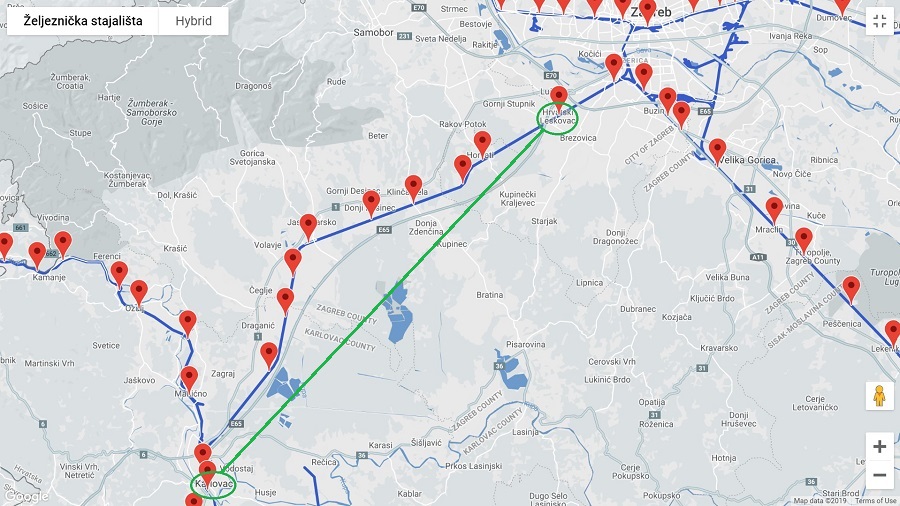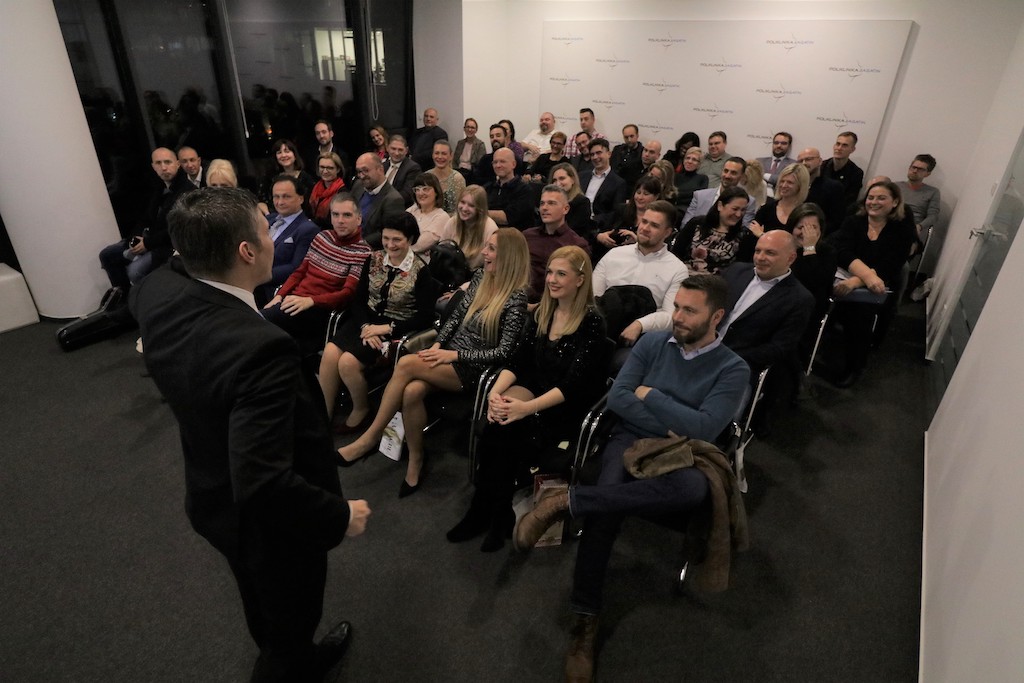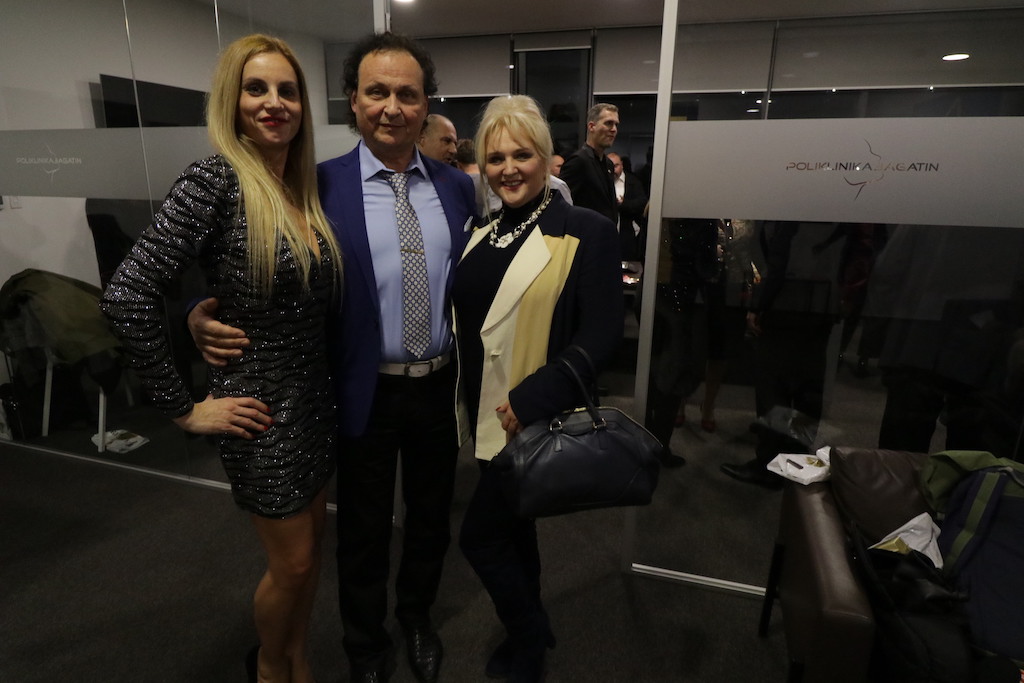Turkish Smuggler Crashes Migrant Van into Croatia Police Vehicle
Police officers from the Zagreb Police Department are conducting a criminal investigation involving a 34-year-old Turkish national, who attempted to smuggle 15 migrants, after he disobeyed police orders, hit a police vehicle with his van and attempted to flee.
The suspect has been detained on charges of committing the criminal offenses of "Illegal entry, movement and stay in the Republic of Croatia, another EU Member State or signatories to the Schengen Agreement", "Coercion against an official" and "Damage to someone else's property," according to Laura Vuckovic/Zagreb Info on December 28, 2019.
On Tuesday, December 24, 2019 at 12:45am, police officers stopped an Iveco Daily van with German license plates, which was driven by a 34-year-old Turkish national, at the Sveta Helena rest stop on the A4 Zagreb – Goričan motorway. Upon inspection, the officers discovered 15 asylum seekers in the cargo area of the van.
Turkish National Loaded Van in Zagreb
A criminal investigation has confirmed that the suspect, a Turkish national, placed the 15 asylum seekers in the cargo area of a van on December 24, at an undetermined location in Zagreb, with the intention of acquiring undue financial gain. While driving on the A4 Zagreb - Goričan motorway, he was spotted and stopped by police officers at a gas station, and the police officer identified himself to the driver with a badge and ID.
Although the police officer was standing next to the driver's door, the suspect disobeyed his order to turn off and exit the vehicle. Then, he attempted to flee by driving away and struck the front door of the police vehicle with his van. After about 15 meters, police officers prevented him from going any further and escaping.
After the initial criminal investigation was completed, the suspect was handed over to the detention supervisor, and a criminal complaint was filed with the State Attorney's Office on suspicion of committing the above-mentioned criminal offenses.
Almost 1000 Migrant Smugglers Arrested in Croatia
As of December 27, 2019; 976 migrant smugglers have been arrested in Croatia and charged with 904 crimes. As of the same date; 1,661 people have also applied for international protection in Croatia. In more than 70 percent of those cases, the procedure for granting international protection has been suspended because the applicants have arbitrarily left the official asylum seekers' shelter, which suggests a systematic abuse of the Procedure for International Protection.
In this scenario, asylum seekers, after being discovered while attempting cross the state border illegally into Croatia, most often within Lika-Senj Police District, express a false intention to seek international protection in Croatia after they have been detained. Then they use smuggling networks to continue their journey to their destination countries (Austria, Germany, Italy).
According to Zagreb Police, these scenarios are referred to as “secondary migrations” because they are comprised of exclusively economic migrants. These migrants do not appear to show any evidence of persecution in their country of origin, nor in the countries they are attempting to enter Croatia from (Bosnia, Serbia).
TCN reported another crash earlier this year which involved a Serbian national driving a van filled with 33 migrants, who crashed into a roadblock while attempting to flee police.
Follow our Politics page for coverage on the migrant crisis in Croatia.
Zagreb to Karlovac in 30 Minutes: Croatian Railways Upgrade Project
The train ride from Karlovac to Zagreb currently takes an hour. A track reconstruction project of the Hrvatski Leskovac - Karlovac railway line, worth 3.45 billion HRK (463.4 million EUR), will cut the train journey to 30 minutes.
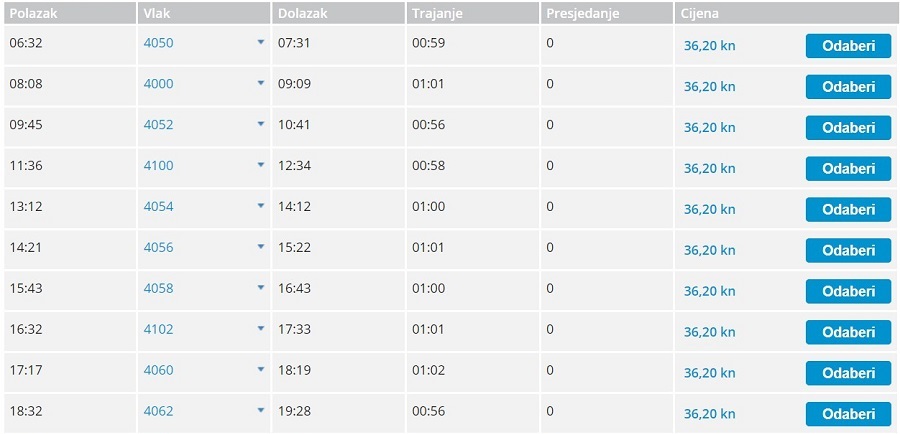
Section of Current Weekday Zagreb - Karlovac Train Schedule | Croatian Railways
Prime Minister Andrej Plenković attended a ceremony in Karlovac on December 27, 2019 to sign the grant agreement for the project to rebuild the existing railway line and construct a second track from Hrvatski Leskovac to Karlovac.
Zagreb – Karlovac Train Speeds to 160km/h
It is a 44-kilometer section of the railway, and its reconstruction and second track upgrade will improve suburban traffic from Zagreb to Karlovac, and is part of a larger project to build a lowland railway from Hungary to the Port of Rijeka, which will improve connections to the markets of Central Europe.
The project encompasses the reconstruction of the existing railway line and the construction of a second track. It also includes the renovation of the Hrvatski Leskovac, Jastrebarsko and Karlovac railway stations, while the Horvati, Zdenčina and Draganići stations will be transformed into stops. The existing stops Mavracići, Desinec, Domagovići and Lazina will also be renovated. The reconstruction of the railway line will include upgrading and modernizing a stable railway track and installing signaling and telecommunications systems, which will enable maximum train speeds of 160 km/h.
Current 44 Kilometer Track Upgrade and Construction | Croatian Railways
Increased Use of EU Budget Funds for Infrastructure
The Prime Minister stressed that it is important that this event is happening just a few days before Croatia takes over the Presidency of the Council of the European Union, according to 01Portal on December 27, 2019.
“In public life, it is important to continue to raise awareness of the added value of EU membership. This project, worth 3.45 billion HRK, of which 2.7 billion are entirely grants from the European budget to Croatia, is another example of how important EU membership is for the development of Croatia, and for the development of transport or railway infrastructure in this particular case,” Prime Minister Plenković pointed out.
Croatia to Invest 3 Billion EUR in Railway Upgrades
He announced that Croatia will invest 3 billion EUR in railway infrastructure improvements over the next ten years. He added that the reconstruction of the main train station in Karlovac was also a sound investment for Karlovac, and an effective use of European funds.
“Karlovac will obtain a modernized renovated station and, most importantly, our Karlovac residents will arrive in Zagreb twice as fast as they can currently,” said the Prime Minister, pointing out the additional value of this project, which increases the overall percentage of fund usage within the EU budgetary framework to 83 percent.
The contract for the grant was signed by the Minister of the Sea, Transport and Infrastructure Oleg Butković, the CFCA (Central Finance and Contracting Agency) Director Tomislav Petrić and the President of the Board of HZ (Croatian Railways) Infrastructure Ivan Kršić. The Hrvatski Leskovac - Karlovac track section is a part of the Zagreb - Rijeka railway line.
Upgrades Underway for Entire Zagreb – Rijeka Line
“Tenders are underway for project studies to upgrade the next two railway sections to Rijeka: Karlovac - Oštarije and Oštarije – Škrljevo. We have obtained the necessary location permits and plans are also underway to improve the Škrljevo - Rijeka - Jurdani section, which is the fourth and final section of the Zagreb - Rijeka railway line,” Ivan Kršić noted.
Follow our Travel page for more information on upgrades to transportation infrastructure in Croatia.
Zagreb Residents Chant 'Prison' at Protest Against Mayor Milan Bandić
More than 1,000 Zagreb residents and supporters chanted “prison” for Mayor Milan Bandić at yesterday’s protest in the city's downtown square.
The demonstration, which was organized to protest the Zagreb mayor and multiple USKOK (Croatian State Prosecutor's Office for the Suppression of Organized Crime and Corruption) inductee Milan Bandić, was held at Trg bana Jelačića, the main city square, according to Index on December 21, 2019.
The protest began at 16h and was organized by a number of associations: Udruga građana Siget (the Siget Citizens' Association), Braniteljska udruga Vidra (the Veterans of Vidra), Veterani i društvena akcija sa Zelenim odredom (the Veterans' Association with Green Squad social action group), Udruga za zaštitu okoliša UZOR iz Resnika (the UZOR Environmental Association of Resnik), Udruga Eko-Zagreb (the Eco-Zagreb Association), Inicijativa Samoborček (the Samoborček Initiative), Inicijativa Hipodrom (the Hipppodrome Initiative), and the građanska inicijativa Zagreb bez zračenja (Zagreb Radiation-Free Initiative).
According to organizers, the protest gathered around two thousand citizens. They are planning another protest at the end of January.
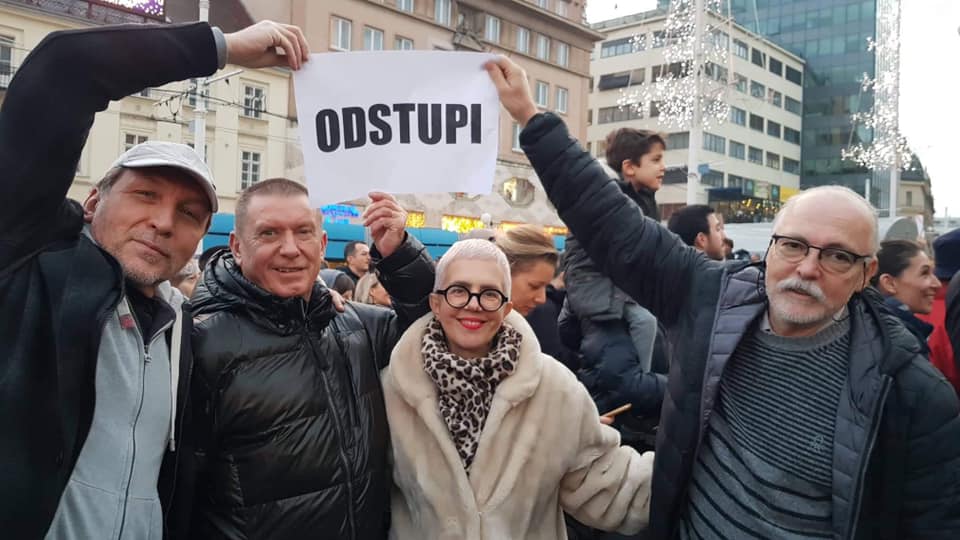
Clear Message from Zagreb Protesters: Resign!
Among the messages on the banners were "Resign", "Enough of Banditism", "Your Mayor is poisoning you and robbing you", "Bandić's godfathers: You will fall into Resnik" (Resnik is a garbage dump in Zagreb), "Put the right thing (Bandić) in the right place in Remetinec" (Remetinec is a Zagreb prison), "Zagreb must not be defined by Milan Bandić"," Whose benefitting from the garbage centers?" and "Bandić and his 26 bandits".
City Council 'Thieves' Voted for Waste Removal Cost Increase
They explained that these "26 thieves" are the city council members who voted for an increase in waste collection costs and will be voting on the GUP (General Urban Plan). The protesters also exhibited four garbage bags which contain the names of the mayor and his associates, Mirka Jozić and Sanja Jerković, with one bag saying "26 city deputies."
They called the bags "radioactive waste", which they say will be taken to Bandić and the Zagreb City Administration on Monday where they will be placed under a pine tree.
Gordana Pasanec, from the Siget Citizens’ Association, said that they were protesting because they were fed up with Milan Bandić's despotism, from the "golden toilets", and benches for 20, 30, 40 thousand HRK, his bullying of city government staff, and his insults directed at journalists and citizens.
She also pointed out that Zagreb is separating only 10 percent of its waste, there is no real waste management system or fair billing and Zagreb streets are flooded with waste.
"The chaos we are witnessing is the result of a long-standing (lack of) waste management policy implemented by the Mayor of Zagreb. There is no single justifiable reason for this; no increase in services except for the systematic robbery of citizens by the Mayor through waste collection, which has benefitted individuals and interest groups for 20 years.
Branka Genzić-Horvat from UZOR said that they have been protesting for 14 years and because they are fed up with what is happening and want to make Zagreb a better place to live.
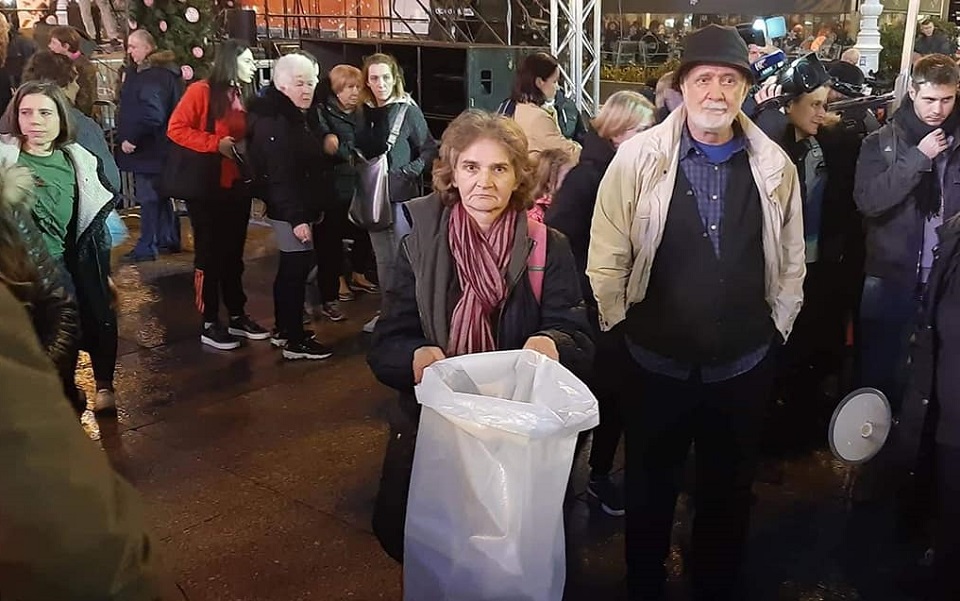
Pensioner in Wheelchair Calls Bandić 'Garbage'
Višnja Škreblin, who was introduced as the oldest activist, said that Bandić has consolidated his power (over the city) and has humiliated and belittled its citizens. “He says 'if you can't pay the cost of utilities and services, then you should leave Zagreb,’” which infuriated the wheelchair-bound pensioner, who publicly called Bandić "garbage."
"We have been witnessing this for 14 years. And it all started back in 2005 under the leadership of a mayor who has put himself at the forefront of these interest groups. The Waste Management Center is a continuation of concocted thievery, which this mayor carries out in the interest of specific groups and individuals. The Ministry of the Environment has backed an octopus who has ruled Zagreb and Croatia for many years," she said. She also said that for 14 long years they have been closely watching every step of this mayor and now the “water has reached her throat".
Ivan Kos from the Eco-Zagreb Association said that what Mayor Bandić is doing was "unacceptable".
Fled Scene of Drunk-Driving Accident in 2002
Bandić, a onetime member of SDP (Social Democratic Party) was elected mayor of Zagreb in 2000 and re-elected in 2001. In 2002, Bandić fled from the scene of a motor vehicle accident while under the influence of alcohol and was forced to resign.
The Zagreb SDP had the authority to nominate a new mayor, but the city council was so dominated by Bandić that it was questionable who would be able replace him. Eventually Vlasta Pavić took over, while Bandić retained a position as deputy mayor. However, he was eager to become mayor again, and blocked Pavić's development plans while pushing for an early election. In response, Ivica Račan (then head of SDP) tried to restrain Bandić's activities.
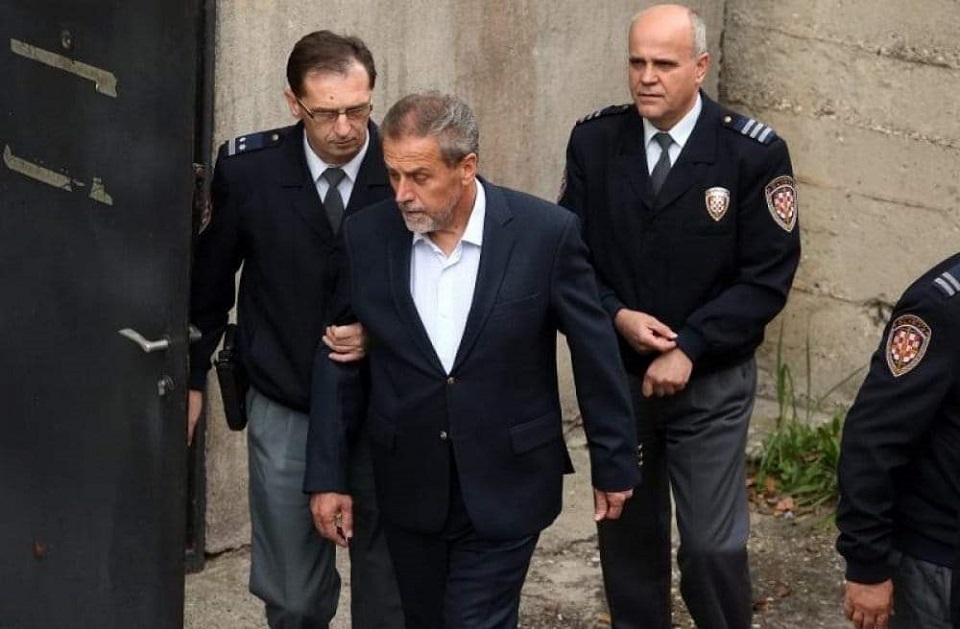
Successful Power Grab Led to 2005 Reelection
At that time, the law would not allow Bandić to serve a second term as mayor. Although Vlasta Pavić attempted to strike a deal to end their ongoing feud, but Bandić eventually succeeded in undermining her authority. Even though early elections were not held, he was re-elected mayor in 2005.
Bandić is currently serving his sixth term as Mayor of Zagreb. His administration has been defined by scandal and accusations of corruption. Bandić left SDP in 2009 and identified as an independent candidate for six years. In 2014, he was arrested on charges of corruption, bribery and organized crime, along with two other members of the Zagreb City Council. In 2015, he founded his own party, the Bandić Milan 365 – Labor and Solidarity Party. The 365 in his party’s name refers to his claim that he works for the city of Zagreb as mayor every day of the year.
In the 2017 local elections, Bandić narrowly defeated challenger Anka Mrak Taritaš. His current term ends in 2021.
Follow our Politics page to keep up with protests against the Bandić administration. For more information on upcoming protests against the Mayor, check out the Zagreb Te Zove (Zagreb is calling you) page on Facebook.
Are Three of Largest Zagreb Roads Set to Get Third Lanes?
As Poslovni Dnevnik writes on the 21st of December, 2019, the divestment itself, as they have also pointed out from the City of Zagreb, would allow for a much higher acceptance of traffic on these Zagreb roads, and thus relieve the city centre of traffic, which would also help in a more accurate timetable for public transport.
A third lane and partial denivelation appear to be in the City of Zagreb's plans. The level of traffic in Zagreb these days has caused issues, so, after the City of Zagreb announced a call for proposals for the conceptual design of an extension to Kranjčevićeva, they are now looking to complete a traffic study that will solve the traffic jams on three main Zagreb roads: Slavonska, Zagrebačka and Ljubljanska avenues, Vecernji list writes.
All of this will come with a price tag of 800,000 kuna, and the new design of the Zagreb roads should demonstrate the ability to avoid the congestion that, from west to east, sees about 80,000 vehicles every day as they cross those particular avenues.
For those who want to do a traffic study for the City of Zagreb, this should be done according to a project assignment that already states clearly that the whole problem could be solved by adding a third lane to the currently predominantly two-lane Zagreb roads, and in parts, it should be levelled because these additional traffic jams, at least according to the city government, are created at intersections.
''At peak traffic intervals, saturation is present on certain sections or throughout the avenues. One of the causes of congestion is that most of the intersections on that corridor are at the same level with the roads that connect to it. Despite the fact that all intersections are equipped with state-of-the-art signalling devices and equipment that works depending on the amount of traffic, it's very demanding to try to harmonise the signalling plans, which will allow for the satisfactory flow and travel time of the cars, due to the high traffic load and the limited capacity of roads,'' they stated from the city government.
They want the traffic study they are commissioning to show whether the avenues should be widened to add another lane and whether they should level or "possibly reshape" the existing traffic lights, which are now level with other connecting roads.
The experts who will conducted the 800,000 kuna traffic study must, among other things, count the vehicles along the corridor of the three aforementioned Zagreb roads and anticipate what will happen to the volume of cars, buses and trucks by 2030 if no road interventions are made and no action is taken, at the minimum of what is now being proposed.
Make sure to follow our dedicated lifestyle page for much more. If it's just Zagreb you're interested in, give Total Zagreb a follow or check out Zagreb in a Page.
Croatia Court Decision: Gay Couple Allowed to be Foster Parents
For the very first time in Croatia, a Zagreb court rules that same-sex married couple Ivo Šegota and Mladen Kožić have the right to be foster parents, and the Ministry of Demography, which rejected their request to provide foster care last year, must implement the new decision within 60 days, this time in accordance with domestic and international legislation.
It stems from yesterday’s decision by the Zagreb Administrative Court, which annulled previous decisions including the refusals of the Center for Social Welfare and the ministry, according to Kristina Turčin/Jutarnji List on December 19, 2019.
Croatia Court Decision Final: No Appeal Allowed
“The court's decision is binding, and an appeal is not allowed, so this judgment is final. The written ruling has not yet arrived, but as stated during the announcement, the court accepted our argument in the lawsuit, based on Croatian regulations and the European Convention on Human Rights. As a result, the court ordered the relevant government agencies to implement the new decision in accordance with the judgment. We believe that the agencies will respect the court decision,” stated Sanja Bezbradica Jelavić, the attorney representing Ivo Šegota and Mladen Kožić.
“We are overjoyed. As we told the judge, this is the Christmas gift we didn't dare hope for,” Šegota revealed.
In 2015, he and his partner Mladen Kožić were among the first couples to enter a life partnership after the Life Partnership Act was passed in Croatia. Their desire to grow their family and raise children has existed for a long time.
Request to Adopt Rejected: Court Case Pending
“We have wanted to be parents for a long time. Therefore, shortly after our partnership ceremony, we submitted a request to the Center for Social Welfare to become adoptive parents, but were rejected immediately, which is why we have also initiated a lawsuit in the Zagreb Administrative Court, which is still pending,” according to Šegota.
They were not discouraged and started considering other options, such as foster care.
“We gave it a lot of thought. We are aware that this is temporary, rather than permanent childcare, and that foster parents are not adoptive parents, but we have concluded that this option is still a dream come true,” he continues.
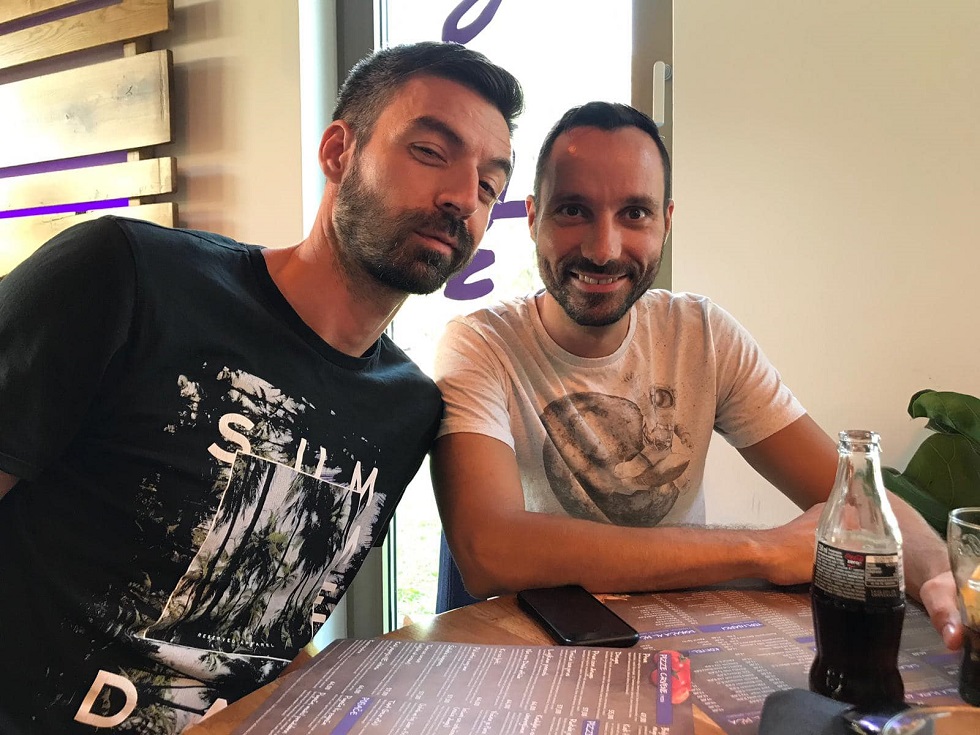
Applied to Become Foster Parents as Adoption Alternative
Therefore, Šegota applied with his life partner Mladen Kožić to the Zagreb branch of the Center for Social Welfare to become foster parents in the summer of 2017.
“Our application was very well received, especially by the psychologist and the social worker, who were particularly pleased when we announced that we were interested in fostering two or three children. Zagreb lacks foster families, especially those with the capability and desire to foster more than one child, which is why the centers are often forced to separate biological brothers and sisters,” he explained.
They both underwent an extensive psychological assessment process, during which they performed parenting skills tests, interviews, and discussed their motives for becoming foster care providers. A social history evaluation was also performed to assess their environment and family support network.
Center Rejects Foster Application Even Though Requirements Met
“We completely satisfied the requirements, received a positive assessment and everyone seemed pleased that this was happening. However, suddenly the center stopped contacting us. After the positive evaluation, we should have begun compulsory foster care training, which would have been followed by obtaining a foster care license. Suddenly, we could no longer get a response, and then in early December 2017, we were informed in writing that there were no legal prerequisites for initiating the licensing procedure because we are in a life partnership,” Šegota recounted.
They were very disappointed, he says, because after the initial response, they had hoped everything would be okay. After all, the Life Partnership Act clearly states that life partners are supposed to be legally on par with heterosexual spouses. As lawmakers have often pointed out, the only right that can be challenged is joint adoption of children - but not foster care, which is a profession and does not imply permanent childcare.
“We immediately submitted complaints to the Ministry of Demography about the center’s decision, but they rejected our appeal. We had no option but to institute legal proceedings,” they concluded.
Discrimination Lawsuit Initiated in July 2018
Their lawyer Bezbradica Jelavić initiated the lawsuit in July 2018. She noted that the center had begun the official evaluation of Šegota and Kožić in accordance with the Foster Care Act, but despite conducting a full procedure, which lasted four months, the center eventually rejected their request "because of a lack of legal presumptions.”
"Such a sudden detour in the evaluation process led us to the conclusion that there was a directive from above to treat these applicants differently. Considering the abrupt termination of the proceedings which were already underway, and even though the plaintiffs had met all the legal requirements, it's obvious that the Center for Social Welfare's treatment of the applicants was discriminatory due to their sexual orientation." The lawsuit further outlined the plaintiffs’ right to equal treatment and family life according to the law. National regulations, the constitution and international treaties guarantee the prohibition of discrimination as specified by the Convention for the Protection of Human Rights and Fundamental Freedoms.
"The plaintiffs state that they became aware that the Center for Social Welfare had abruptly discontinued another foster care evaluation involving life partners. This case, which had reached a later stage in the assessment, indicated that discrimination against same-sex couples exists within the organization," the lawsuit concludes, and cites several judgments from the European Court for Human Rights regarding similar cases, which were decided in favor of same-sex couples.
Well-Being and Interest of Children Should Come First
In the lawsuit, they also cautioned that the sole focus of the foster care profession should be the interest and well-being of children, not the sexual orientation of the foster parents, especially given the fact that the demand for foster parents is extremely high.
"Thus, by rejecting the request for foster care, the Center for Social Welfare in Zagreb violated not only the applicant's fundamental human rights, but also the right of a child or more children to quality accommodation and care, which they would receive in a stable family setting." According the center’s own evaluation, Šegota and Kožić demonstrated that they could provide this kind of environment, before their application was summarily rejected.
“The court fully accepted this argument in the lawsuit,” confirmed Bezbradica Jelavić, attorney for the couple.
Šegota and Kožić believe that the ministry and the foster care team at the Center for Social Welfare will respond quickly to the decision by the Zagreb Administrative Court. However, since the verdict has just been published and a written explanation is still pending, the Ministry of Demography has not yet been made aware of the details and could not comment or announce how it would react.
Excited to Finally Become Foster Parents
“We have patiently awaited this verdict. And we’re excited because we believe that we’ll be licensed as foster parents within the next few months and a child will arrive in our family. Or more children,” Šegota hopes.
He points out that this decision is completely in line with the foster care profession because, he emphasizes, foster parents do not have a right to a child, but every child has a right to a family.
"We hope that our family will be the right one for a child," he conveyed. Kožić adds that it is good that the decision has been redirected to the requirements of the profession because the rights of a child should not be the topic of daily political debate.
“The government, after adopting the new Foster Care Act, reiterated that they did not want to explicitly allow life partners to provide foster care because it contradicts their worldview, but at the same time they indicated that if the court rules otherwise, they will respect the court's decision. Now the court has provided children who don’t have a family with an opportunity for Santa Claus rather than a Grinch. Because it is the right of every child to grow up in a loving family, and not in an orphanage,” Kožić concludes.
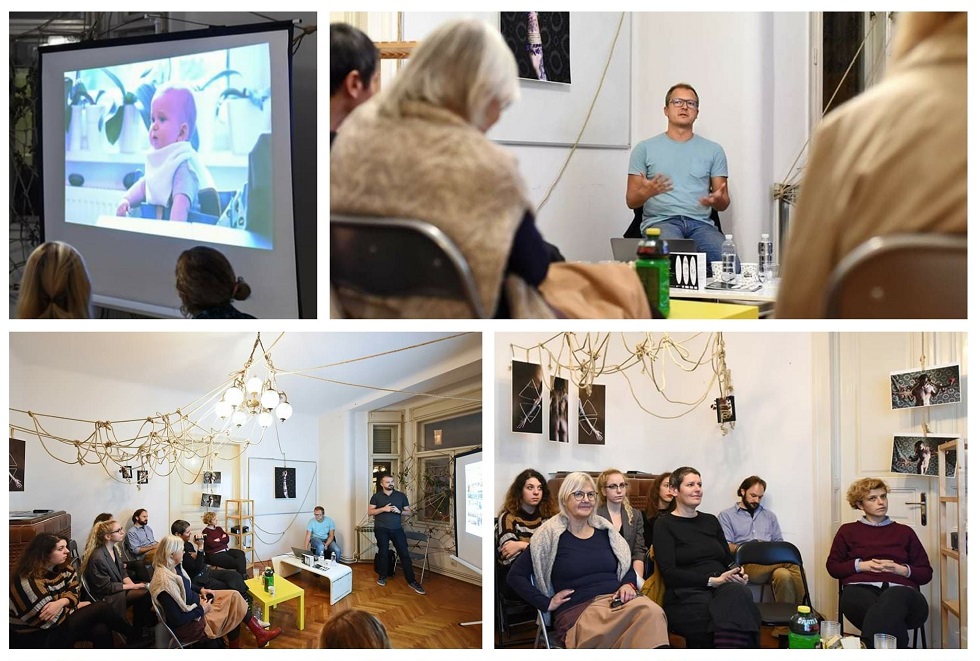
Founding Members of Croatia Based ‘Rainbow Families’
Šegota and Kožić are among the founders of the Croatia based group “Rainbow Families,” which is modeled after similar organizations worldwide, and brings together LGBTIQ couples and individuals who have children, want to have children, or would like to learn more about the rewards and challenges of raising a family.
Members of the organization first came together in 2011 in a psychosocial support group organized by the Zagreb Pride Association, led by psychologists Iskra Pejić and Matee Popov. After completing two support group cycles, the group members continued to meet and socialize as an informal citizens' initiative. Then, they established a forum and a website. In 2017, their association was officially registered. In 2018, they published an illustrated book titled "My Rainbow Family,” which was first book in Croatia to feature children with same-sex parents. In 2019, they organized the first international conference on rainbow families called “Our Children Are Fine.” Rainbow Families regularly organizes group activities and gatherings, which continue today.
For non-traditional families in Croatia, sharing experiences with others in similar circumstances can be very rewarding and fulfilling. In Rainbow Family meetings, LGBTIQ parents, and those planning parenthood, are given the opportunity to share their experiences and get to know each other.
Full Joint Adoption by Same-Sex Couples Legal in Seventeen European Countries
Full joint adoption by same-sex couples is legal in seventeen European countries: Andorra, Austria, Belgium, Denmark, Finland, France, Germany, Iceland, Ireland, Luxembourg, Malta, the Netherlands, Norway, Portugal, Spain, Sweden and the United Kingdom. Another five: Estonia, Italy, Slovenia, San Marino and Switzerland permit stepchild adoption in which the registered partner can adopt the biological and the adopted child of his or her partner in some cases. In Croatia, a life partner may become a partner-guardian over their partner's child, which is somewhat comparable to stepchild adoption. The new policy in Croatia follows that of Greece in which same-sex couples in a civil partnership may become foster, but not adoptive, parents.
Follow our Politics page for more information on LGBTIQ rights in Croatia.
Adria Business Network Humanitarian Event Successfully Held at Bagatin Clinic
December 20, 2019 - The third Adria Business Network was organized at the Bagatin Clinic and hosted by entrepreneurs Željka Barišić and Kristina Krstinić. The primary goal of this event was to donate a portion of the ticket sales to the blind and partially sighted residents of the "Vinko Bek" Center for Education in Zagreb.
Director of Bagatin Clinic and guest lecturer Ognjen Bagatin, revealed:
“The third Adria Business Network business event was held on December 18, 2019, with us in the educational area of the Bagatin Clinic, where, in a holiday atmosphere, I was pleased to welcome many people of goodwill and open hearts.
It is often difficult to convey the atmosphere in words and pictures, but the radiant faces and extremely positive feedback of all participants is one of the most beautiful things that I, as a lecturer and host, could receive. Speaking of business optimization and growing the Bagatin Clinic brand, which is today the best cosmetic surgery clinic in the world, I actually wanted to send a more profound message that can be identified by all people of the enterprising spirit, from those who are just starting out to those who lead a big business. Most of all, I am glad that ticket sales went into the right hands. The funds from this event will be donated to the Vinko Bek Center for Education of the Blind and Visually Impaired. Thanks to everyone who responded! Thank you Željko and Kristina, for successfully connecting us! As far as I'm concerned, the Christmas celebration can begin!"
During the event, everyone was given an opportunity to network, find new clients, and take part in a lucrative business, as is the purpose of this gathering.
“The top lecture by the Bagatin Clinic director delighted all those present to the point that they almost left the room floating! I must admit that I have not heard such an inspirational speech in a long time, and everyone in the hall agreed. I want to thank Mr. Bagatin for hosting us in his premises and for making this the most successful Adria Business Network by all criteria. I would also like to thank everyone who helped the Vinko Bek Center for Education by purchasing a ticket. We are happy and motivated to continue, so follow us on social networks and visit us at the next event to continue feeling this fantastic energy,” said Željka Barišić, owner of Forca Digital Agency and one of the founders of Adria Business Network.
Kristina Krstinić, owner of MIKRIS Project Management in Zagreb and founder of Adria Business Network, added:
“It is imperative that entrepreneurs and those who want to become one hear as many inspirational and encouraging stories as possible. One of these is certainly the successful, but not easy, journey of Ognjen Bagatin and his team at the Bagatin Clinic. That is, when you have clear goals and are committed to them, success will come. I want to thank everyone who supported us in raising funds for the Vinko Bek Center for Education, and we are pleased that during this holiday time, we were able to contribute to bettering the lives of the Center's residents."
The general sponsor of the event was the Bagatin Clinic, while other sponsors were photographer Hrvoje Podobnik Gero, Avon, InspireMe, Delicatessen Prtenjača, Aero Print, Bisneys and Montana Plus.
Media sponsors of the event are the magazine and portal Poduzetnik, Časopis, Zaposlena, Netokracija, She.hr, Zagrebonline.hr, Story.hr, Rep.hr, Glas Istre, Flash.hr, Moja Domovina and Total Croatia News.
You can follow Adria Business Network on Facebook here.
To read more about business in Croatia, follow TCN’s dedicated page.
Works Launched on New Block of Zagreb Power and Heating Plant
ZAGREB, December 20, 2019 - A ceremony was held in Zagreb on Thursday to mark the start of construction work on a combined co-generation unit at the Zagreb KKE EL-TO combined power and heating plant, an investment worth 900 million kuna (approx. 121 million kuna).
The new, high-efficiency block, with a capacity of 150 megawatts of electricity and 114 megawatts of heating energy is the single biggest investment of the state-owned HEP power company in new production facilities in the last 10 years, it was said at the ceremony, which was attended, among others, by Prime Minister Andrej Plenković and HEP Management Board chair Frane Barbarić.
The expected average annual output of the new block is 675 gigawatt hours (GWh) of electricity, 450 GWh of heating energy for Zagreb's central heating system, and 160 GWh of industrial steam. The electricity produced by this unit will meet the consumption demand of close to 200,000 households.
Thanks to its most modern Siemens technology of combined co-generation, the new block will save up to 25% of primary energy from natural gas. Also, once its old and inefficient units are the Zagreb KKE EL-TO combined power and heating plant will emit considerably less carbon dioxide and other pollutants.
The project is to be financed with loans granted by the European Bank for Reconstruction and Development (EBRD) and the European Investment Bank (EIB), with guarantees having been provided by the European Fund for Strategic Investments, the main platform of the European Commission's Investment Plan for Europe.
The contract on construction work and a contract on long-term maintenance were signed in July 2018 with the Italian company FAT S.p.A.
PM Plenković said that this was yet one more major investment in the national energy system, expressing satisfaction that, in line with the national energy strategy, HEP's activities were directed at renewable energy sources.
Barbarić said that the investment would bring multiple benefits, notably for 80,000 residents of the western part of Zagreb, who in the long run would obtain a safer source of heat.
He said that this was HEP's biggest but not only investment in power plants, citing in that context the Kastelir solar power plant in Istria, which has been put into operation, construction work on a power plant on Vis island that is nearing completion, as well as work on the Korlat wind power plant, which is also nearing completion. Three solar power plants are to be built on the island of Cres and preparations are under way for the construction of a solar power plant near Vrlika, said Barbarić.
All projects, including the one in Zagreb, are part of HEP's scenario of development of renewable energy sources, as part of which power plants with the capacity of 1,500 megawatts will be built until 2030, he said.
Asked by reporters about problems with heat supply in Novi Zagreb, Barbarić said that currently work was underway on absorbing around 64 million euro from EU funds, on which contracts should be signed in a month or two, to replace 62 kilometres of district heating pipes in Zagreb, which would help remove the problem.
HEP will provide an additional HRK 150 million of its own funds to renovate heating pipes in Zagreb, Barbarić said, recalling that HEP had so far invested 10 million euro to install new heating pipes in Osijek.
More Zagreb news can be found in the Lifestyle section.
Transport in Zagreb: West and East Could be Connected by "Semi Subway"
When you think of public transport in Zagreb, your mind likely doesn't wander far from the blue trams snaking through the city. But what if something new were to appear to connect East and West Zagreb in a much better way than they're currently connected transport-wise? An interesting idea has surfaced...
As Poslovni Dnevnik writes on the 19th of December, 2019, the three hundred thousand kuna document will have to be produced by whichever company wins the tender.
The tram on Malešnica, pleasantly ridden all the way to Adžijina, then descending to -1 on an underground floor through Donji Grad (Lower Town) and after Zvonimirova, once again back up to the surface and slightly all the way to Dubec, states a report from Večernji list on the idea for this new type of public transport in Zagreb.
Yes, this sounds a bit like something out of a sci-fi movie, something one can barely imagine when packed onto a crowded tram like cattle and driven along at what often seems like a snail's pace all through Zagreb's hellish rush hour traffic jams.
This idea will be decided on by the Assembly in February, and it seems the timing is perfect. The City of Zagreb could have simply neglected the idea of this "semi subway" had no tender been announced for the development of the conceptual design of the extended Kranjčević street, which should make up exactly one part of the section of that potential future tram route.
As previously touched on, the three hundred thousand kuna document will have to be produced by the company that wins the tender and that will be the basis for obtaining a location permit for a future route.
The City of Zagreb now wants to obtain a location permit based on a project that will be worked on along a 700-metre-long stretch from Selska cesta to Fallerovo šetalište.
Make sure to follow our dedicated lifestyle page for much more. If it's just Zagreb you're interested in, give Total Zagreb a follow or check out Zagreb in a Page.
Beck and Deftones Announced as First Major Headliners of INmusic Zagreb
December 18, 2019 - INmusic Festival in Zagreb will hold its Jubilee 15th edition next year, which will take place from June 22-24, 2020. Beck was announced on Wednesday as the festival’s second headliner.
Jutarnji List reports that the seven-time Grammy award winner, a multitalented artist and risk taker in many musical genres, announced a European tour by confirming his performance on the main stage of the 15th edition of the INmusic Festival.
Beck's impressive career is characterized by playing with a variety of music genres and a genuinely distinctive sound. The diverse opus of fourteen studio albums has earned Beck the status of arguably the most original and creative alternative rock musician of the past decade.
Drawing on a full range of musical styles, from folk, psychedelia and funk to soul, hip hop, alternative rock, pop, and electronic music, Beck's sound is a hybrid that is unique in the world of music. Over fifty nominations for international awards in the fields of music, design and audiovisual media and twenty titles won, including seven Grammys and three Brit Awards, confirm Beck's global status as a multi-faceted artist whose relentless energy of creation pushes the boundaries with each new studio release.
Thirteen gold and multi-platinum studio albums worldwide, sold-out world tours, countless collaborations with musicians from across the spectrum of contemporary music and unique multidisciplinary art projects are an impressive introduction to his latest, fourteenth studio album, Hyperspace, which was released at the end of November 2019 and presents another face of Beck in the 21st Century.
Nine days ago, the first big name of the 15th edition of INmusic was released. California alternative rockers Deftones will take the stage as part of a tour promoting their long-awaited ninth studio album.
The Deftones were most often associated with ‘nu-metal’, but because of the specificity of their sound, they were never easy to be defined. Critics have also described them as alternative metal, art-rock/art metal, experimental rock, post-punk, and even dream-pop and trip-hop.
"Since its inception, the multiplatinum and Grammy Award-winning California alternative rockers Deftones have been pushing to create music that is unique to them - balancing and exploring the extremes of aggressive metal sound and elements of psychedelia and shoegaze," INmusic announced.
The Deftones performed in Zagreb back 2006, in the backyard of club Močvara, which was the first performance of the band in Croatia, though they have been active for over thirty years. Deftones was founded in 1988 by Chino Moreno, Stephen Carpenter and Abe Cunningham, high school friends who were connected by the local skateboard scene. The line-up has changed several times, as the members also had side projects, but they maintained continuity in releasing albums and concert performances.
The INmusic Festival, which celebrates its 15th anniversary next year, will be held from June 22 to 24, 2020, at the traditional location of the Jarun lake in Zagreb. Three-day festival tickets are available through the official festival webshop.
To read more about lifestyle in Croatia, follow TCN’s dedicated page.
Zagreb Average Monthly Net Salary Reaches 1005 EUR After Taxes
The average monthly net salary in Zagreb is at 7,487 HRK (1005,71 EUR) and above 10,000 HRK (1342,28 EUR) in some sectors. In September, the highest Zagreb average net salary was recorded in the field of crude oil and natural gas extraction.
Average Net Monthly Salary 1005 EUR
The average monthly net salary for Zagreb employees reached 7,487 HRK in September, which is 0.31 percent higher than August and 4 percent higher than September of last year, according to the latest statistics from the Office for Strategic Planning and Development in Zagreb.
The average salary in September increased by 23 HRK (3,09 EUR) from August and by 288 HRK (38,69 EUR) from September of last year, according to Poslovni Dnevnik/Hina on December 17, 2019.
Zagreb Salaries 144 EUR Higher than Croatian Average
Compared to the average monthly salary for September for the rest of Croatia, which amounted to 6,418 HRK (862,11 EUR) – the average Zagreb monthly net salary for September is 1,069 HRK (143,60 EUR) higher.
According to recent statistics, the average Zagreb net salary for September in the economic sector was HRK 7,289 (979,11 EUR) and 7,883 HRK (1058,90 EUR) in non-economic sectors.
The highest recorded September average net salary reached 12,412 HRK (1667,27 EUR) for crude oil and natural gas extraction. That was followed 10,894 HRK (1463,37 EUR) for financial services, except for insurance and pension funds.

Paweł Czerwiński | Unsplash
Pharmaceutical, Computer, Marketing and Petroleum Industries Over 1340 EUR
Zagreb statistics registered net salaries in excess of 10,000 HRK in the manufacture of basic pharmaceutical products and preparations (10,527 HRK), computer programming, consulting and related activities (10,473 HRK); the manufacture of computers, electronic and optical products (10,423 HRK); publicity and market research (10,208 HRK), and coke and refined petroleum products production (10,173 HRK).
Under 672 EUR in Manufacturing, Food and Beverage and Maintenance
By contrast, the city of Zagreb documented the lowest average September monthly net salary of 4,291 HRK (576,40 EUR) in the sector of apparel manufacture.
Zagreb statistics recorded an average net salary of less than HRK 5,000 in the following sectors. Metal manufacturing salaries averaged 4,432 HRK and textile/leather manufacture salaried were similar at 4,520 HRK. Monthly earnings for food and beverage industry employees amounted to 4,485 HRK. The average wage for building and landscape professions sits at 4,585 HRK. And other manufacturing industry wages are currently averaging 4,894 HRK.
Average Gross Salary Above 1412 EUR
According to statistics from the City Office for Strategic Planning and Development, the average gross salary for September in Zagreb amounted to 10,517 HRK (1412,72 EUR), which is by 0.07 percent lower on a monthly basis, but 4.26 percent higher on an annual basis.
Follow our Lifestyle page for information and updates on salaries and the cost of living in Croatia.

